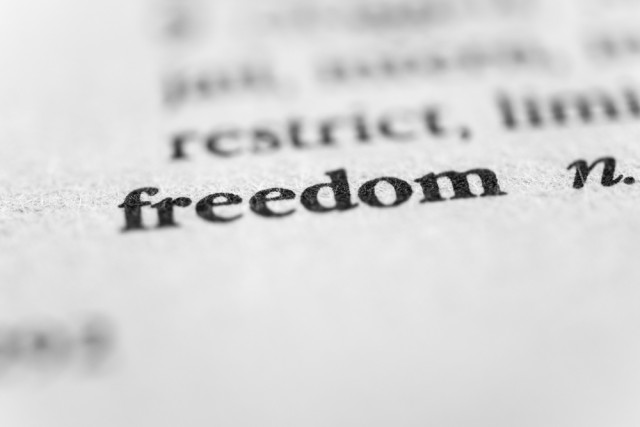In Apple vs FBI, it's our freedom at stake

Ever since it was announced that all iPhones would be encrypted by default with no reasonable way for Apple to unlock them, the FBI has been locked in an ever more acrimonious deadlock with the company. In the latest and most explosive development, the FBI has chosen its battle well: could there be a more emotive subject, or seemingly good reason for Apple to comply, than a demand to decrypt a single phone that belonged to a known terrorist?
By drawing its battle-lines in this way, the FBI achieves two things. On a basic level, it makes Apple look unreasonable for refusing, and therefore makes it easy to paint Apple as the "bad guy" who is preventing the "good guys" from protecting the American people against terrorists. This is a powerful argument, and certainly seems to have persuaded all front-running politicians.
Perhaps more importantly, however, is that it allows the FBI to frame government surveillance powers as a binary trade-off between privacy and security -- if we want to be secure, we must sacrifice a little privacy. As FBI head James Comey writes:
"We have awesome new technology that creates a serious tension between two values we all treasure: privacy and safety. That tension should not be resolved by corporations that sell stuff for a living. It also should not be resolved by the FBI, which investigates for a living".
On the face of it this looks entirely reasonable, but it deliberately (and vastly) oversimplifies what is a complex struggle for the heart and soul, not just of America, but of the future of all humanity.
Fundamental to the idea of freedom are the notions of freedom of expression and freedom of thought, both of which require privacy in order to flourish. New ideas and dissenting views require room in which to develop. People need to discuss them with others, to debate them in public, and to feel free to articulate their beliefs without looking over their shoulders.
It is no coincidence that the first thing every totalitarian regime in the history of the world has tried to do is encourage its own citizens to spy on each other. When people feel they cannot openly discuss topics, and that their every conversation is being recorded and passed on to the government, a "chilling effect" occurs on freedom of thought and expression.
In the years since Edward Snowden’s revelations about ubiquitous NSA spying, for example, PEN America has consistently reported a growing trend for self-censorship among American writers.
Apple has made it clear that this case is not about breaking the encryption on a single phone, as the techniques it would need to develop in order to comply with the FBI’s court order can be applied to other phones (including its latest models). Although there is talk of Apple building future phones that are immune to such attacks, if it loses this case then any such move would almost certainly be regarded as contempt of court, and is therefore unlikely in the extreme.
This battle is therefore about the FBI establishing its moral and legal right to access all private communications, whenever it feels the need, which is why many experts believe that Apple has a strong defense on First Amendment grounds.
As we move towards a digital future in which more and more of our lives’ are played out through the electronic wonders that surround us and reside in our pockets, the question of who can access the devices in which we confide so much intimacy takes on critical importance.
It is also worth noting that by reducing the issue to a simple "privacy vs. security" narrative, all sense of perspective goes out of the window. The San Bernardino shootings were certainly terrible, but the incident pales in comparison against the number of people killed in the US by domestic gun violence each year.
According to the US State Department, 17 US citizens were killed worldwide in 2011 (a figure that includes deaths in Afghanistan, Iraq and all other theaters of war). This means that Americans are nine time more likely to be killed by a police officer than by a terrorist!
The government and the FBI is nevertheless (and with considerable success) using terrorism as a bogeyman to scare the United States public into accepting infringements to their personal liberties that would have been utterly unacceptable just a few scant years ago.
It should also be remembered that this fight has global consequences. If the US government can assert its moral right to force a company to backdoor its own products, then why should China, Iran, or Russia have any qualms about doing so too?
On a more practical note, this would also have disastrous consequences for US businesses (and Apple in particular), because who is going to trust a product they know has, to all intents and purposes, been backdoored by the US government?
Knowing this, the FBI has attempted to smear Apple with accusations of self-interest, claiming that its refusal to comply is "based on its concern for its business model and public brand marketing strategy". Yet none of Tim Cook’s arguments have rested on the terrible toll the outcome of this case could have not just on his own business, but on the entire US technology industry.
Cook has instead (and to his great credit) tirelessly argued that the case represent the thin edge of the wedge (and is in fact being very deliberately used by the FBI as a wedge) to justify government intrusion into all aspects of its citizens’ digital lives. If Apple loses this fight then it is also a loss for us all -- for our freedom, and for our democratic ideals.
Douglas Crawford is a cyber security analyst at BestVPN
Published under license from ITProPortal.com, a Net Communities Ltd Publication. All rights reserved.
Photo Credit: Erce/Shutterstock